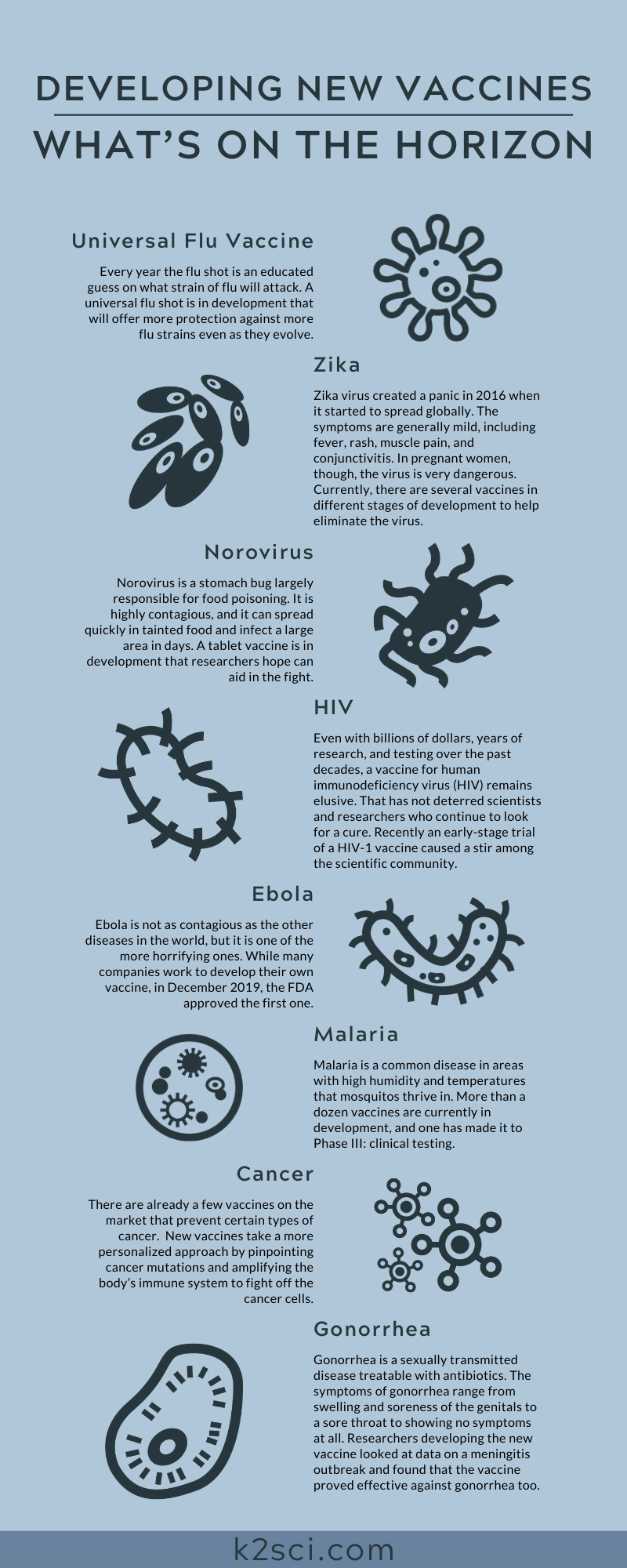One of the best tools humans have to fight disease and viral infections is the vaccine. Vaccines help the body prepare to fight an incoming infection and continue the battle. When handled and stored properly in a medical-grade refrigerator, vaccines can last a long time and maintain their effectiveness. Vaccines are credited with the elimination of smallpox and the near-eradication of polio.
For all their success and the diseases eliminated, there are still diseases out there that we do not have a vaccine or cure for. Researchers continue to look for ways to use the human immune system to trigger the effects of vaccines to cure diseases such as cancer, HIV, and drug addiction. The process of developing vaccines is long and arduous. Researchers engage in years of study, experimenting, and testing just to come up with a viable solution. Then come clinical tests, peer review, and getting it approved by the FDA. All told the process will take years, and often decades, to take a vaccine from idea to inoculating patients.
Science pushes forward, though, and great minds are developing new vaccines all the time to make the world healthier and safer. We discuss nine vaccines currently in development that could change the world for the better.
Universal Flu Vaccine
A person only has to get most vaccines once for it to inoculate them from that specific disease. Influenza is a whole different animal. It constantly changes, adapts, and evolves so that researchers can never pin it down. Every year, the flu shot is an educated guess on what strain of flu will attack. A universal flu shot is in development that will offer more protection against more flu strains even as they evolve. The goal is to create a vaccine that casts a wide net, rather than specific to one strain, that can protect against all the flu viruses forever, instead of getting a shot every year.
Zika
The Zika virus created a panic in 2016 when it started to spread globally. The symptoms are generally mild, including fever, rash, muscle pain, and conjunctivitis. In pregnant women, though, the virus is very dangerous. It can spread to the baby and cause them to be born prematurely, with microcephaly or other congenital malformations. Miscarriage and other complications during pregnancy are also common among Zika virus carriers. At the outbreak, scientists went to work creating a vaccine. Currently, there are several vaccines in different stages of development to help eliminate the virus.
Norovirus
Norovirus is a stomach bug largely responsible for food poisoning. It can cause stomach aches, diarrhea, nausea, and vomiting. It is highly contagious, and it can spread quickly in tainted food and infect a large area in days. There are ways to prevent norovirus, but we still do not have a vaccine. A tablet vaccine is in development that researchers hope can aid in the fight. So far, it is a success in human trials, proving to be safe and capable of creating an immune system response. Before it gets approval from the FDA, it must next prove that it’s effective at safeguarding people against norovirus.
HIV
Even with billions of dollars, years of research, and testing over the past decades, a vaccine for human immunodeficiency virus (HIV) remains elusive. That has not deterred scientists and researchers who continue to look for a cure. Recently an early-stage trial of an HIV-1 vaccine caused a stir among the scientific community. The vaccine caused an immune response in healthy people and was well tolerated by the test subject’s body and immune system. To highlight the amount of time it takes just to get that far, it took 13 years for a slight, positive result. With each new study and eventual failure, new knowledge is gained and built upon for future success.
Ebola
Ebola is not as contagious as the other diseases in the world, but it is one of the more horrifying ones. A person infected with this deadly virus will start out with flu-like symptoms and a lack of appetite. As the disease progresses, it causes internal bleeding and thinning of the blood that results in the carrier bleeding from the eyes, nose, and ears. While many companies work to develop their own vaccine, in December 2019, the FDA approved the first one. The risk of contracting Ebola is low in the U.S., but this is still a huge step forward in the fight against infectious diseases worldwide.
Malaria
Malaria is a parasitic infection caused and spread by mosquitoes. It can lead to fever, chills, nausea, and other complications that result in organ failure and death. Malaria is a common disease in areas with high humidity and temperatures where mosquitos thrive. Prevention efforts such as spraying pesticides and netting are only semi-effective in lowering the number of malaria cases, but they will never fully eliminate it. More than a dozen vaccines are currently in development, and one has made it to Phase III: clinical testing. That is the furthest in the process that any malaria vaccine has made it to date.
Cancer
There are already a few vaccines on the market that prevent certain types of cancer. There is a vaccine against human papillomavirus (HPV) that can prevent six different types of cancer. A vaccine for Hepatitis B is also useful in preventing liver cancer. Now, there is a push to vaccinate a person once they receive a cancer diagnosis. In 2010, one of these vaccinations was approved to help fight colon cancer. The vaccine reprograms the immune system to boost a particular protein that helps the antibodies and white blood cells attack the cancerous cells. New vaccines take a more personalized approach by pinpointing cancer mutations and amplifying the body’s immune system to fight off the cancer cells.
Gonorrhea
Gonorrhea is a sexually transmitted disease treatable with antibiotics. The symptoms of gonorrhea range from swelling and soreness of the genitals to a sore throat to showing no symptoms at all. Regardless if a carrier shows symptoms or not, they are still contagious and a danger to their sexual partners. There have been recent cases that were untreatable with only antibiotics. The response was to make stronger antibiotics and create a vaccine. Researchers developing the new vaccine looked at data on a meningitis outbreak and found that the vaccine proved effective against gonorrhea too. The bacteria that cause both diseases are very similar, almost like cousins.

